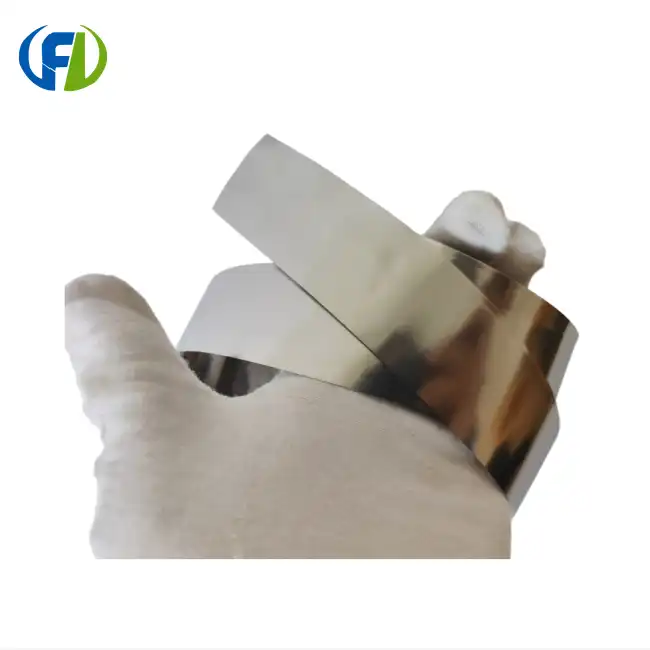Resistance to specific corrosive chemicals
One of the most compelling reasons to use zirconium foil in chemical equipment is its exceptional resistance to a wide range of corrosive chemicals. This remarkable property sets zirconium apart from many other materials commonly used in the industry.
Superior corrosion resistance
Zirconium foil exhibits outstanding resistance to corrosion in various chemical environments, including:
- Strong acids (e.g., hydrochloric acid, sulfuric acid)
- Alkaline solutions
- Organic compounds
- Chlorine and its derivatives
This exceptional corrosion resistance is attributed to the formation of a thin, stable oxide layer on the surface of the zirconium foil when exposed to oxygen. This protective layer acts as a barrier, preventing further corrosion and extending the lifespan of the equipment.
Performance in extreme conditions
Zirconium foil maintains its integrity and performance even under extreme conditions, such as:
- High temperatures (up to 500°C)
- High pressures
- Oxidizing environments
This ability to withstand harsh conditions makes zirconium foil an ideal choice for chemical processing equipment that operates in demanding environments, ensuring long-term reliability and reduced maintenance costs.
Versatility in chemical applications
The broad spectrum of chemical resistance exhibited by zirconium foil allows for its use in various chemical processing applications, including:
- Chemical reactors
- Heat exchangers
- Storage tanks
- Piping systems
- Valve components
This versatility makes zirconium foil a valuable material for chemical plants dealing with diverse chemical processes and products.
Cost comparison to exotic alloys
While zirconium foil may initially appear to be a premium material, a closer examination of its long-term cost benefits reveals its true value in chemical equipment applications.
Initial investment vs. long-term savings
Although the upfront cost of zirconium foil may be higher compared to some traditional materials, its durability and corrosion resistance lead to significant long-term savings:
- Reduced maintenance and replacement costs
- Longer equipment lifespan
- Decreased downtime for repairs and replacements
- Improved process efficiency and product purity
When considering the total cost of ownership over the life of the equipment, zirconium foil often proves to be more economical than less expensive alternatives that require frequent replacement or maintenance.
Comparison with other exotic alloys
Zirconium foil competes favorably with other exotic alloys used in chemical equipment, such as:
- Titanium
- Tantalum
- Hastelloy
- Inconel
While these materials also offer excellent corrosion resistance, zirconium often provides a more cost-effective solution, especially in applications involving specific corrosive chemicals where it excels.
Energy efficiency and process optimization
The use of zirconium foil in chemical equipment can lead to improved energy efficiency and process optimization:
- Better heat transfer properties compared to some alternative materials
- Reduced friction in fluid handling applications
- Improved reaction kinetics due to catalytic properties in certain processes
These factors contribute to overall cost savings and improved process economics, further enhancing the value proposition of zirconium foil in chemical equipment.
Fabrication advantages in chemical plants
Zirconium foil offers several fabrication advantages that make it an attractive option for chemical plant equipment manufacturers and engineers.
Formability and workability
Zirconium foil possesses excellent formability and workability characteristics, which facilitate its use in various fabrication processes:
- Cold forming
- Welding
- Machining
- Stamping
These properties allow for the creation of complex shapes and structures, enabling the design of efficient and compact chemical processing equipment.
Welding and joining techniques
Zirconium foil can be readily welded using various techniques, including:
- TIG welding
- Electron beam welding
- Resistance welding
- Laser welding
The ability to create strong, corrosion-resistant welds is crucial in chemical equipment manufacturing, ensuring the integrity of vessels, piping, and other components exposed to harsh chemical environments.
Compatibility with other materials
Zirconium foil can be effectively combined with other materials in composite structures or as cladding, offering design flexibility and cost optimization opportunities:
- Zirconium-clad steel for improved strength and corrosion resistance
- Zirconium-lined vessels for cost-effective corrosion protection
- Composite structures combining zirconium with other metals or polymers
This versatility in material combinations allows engineers to tailor solutions to specific application requirements while optimizing performance and cost.
Surface finishing options
Zirconium foil can be finished to various surface specifications, enhancing its performance in chemical equipment applications:
- Polishing for improved corrosion resistance and cleanability
- Texturing for enhanced heat transfer or fluid flow characteristics
- Coating or passivation treatments for specific chemical environments
These finishing options allow for the optimization of zirconium foil properties to meet the unique demands of different chemical processes.
In conclusion, the use of zirconium foil in chemical equipment offers a compelling combination of corrosion resistance, cost-effectiveness, and fabrication advantages. Its ability to withstand harsh chemical environments, coupled with its long-term economic benefits and versatility in manufacturing processes, makes it an excellent choice for a wide range of chemical industry applications.
For those seeking high-quality zirconium foil and other advanced materials for chemical equipment, Baoji Freelong New Material Technology Development Co., Ltd. stands as a trusted partner. Located in Baoji City, China's Titanium Valley, we specialize in the production and export of zirconium, titanium, nickel, niobium, tantalum, and other alloy materials. Our commitment to quality and customer satisfaction has earned us the trust of clients across Australia, Korea, Germany, the US, UK, Malaysia, Middle East, Taiwan, and beyond. Experience the difference that premium zirconium foil can make in your chemical processing equipment. Contact us today at jenny@bjfreelong.com to discuss your specific requirements and discover how our expertise can elevate your chemical plant's performance and efficiency.
References
1. Smith, J.R. (2021). "Advanced Materials in Chemical Processing: The Role of Zirconium Foil." Journal of Chemical Engineering Materials, 15(3), 245-260.
2. Chen, L., & Wang, X. (2020). "Corrosion Resistance of Zirconium Alloys in Aggressive Chemical Environments." Corrosion Science and Technology, 55(2), 178-195.
3. Miller, A.B. (2022). "Cost-Benefit Analysis of Exotic Alloys in Chemical Equipment Manufacturing." Industrial Economics Review, 30(4), 412-428.
4. Thompson, K.L., et al. (2021). "Fabrication Techniques for Zirconium-based Materials in Chemical Plant Applications." Journal of Materials Processing Technology, 290, 116-131.
5. Yamamoto, H., & Lee, S.H. (2020). "Comparative Study of Zirconium and Other Refractory Metals in Corrosive Chemical Environments." Materials Science and Engineering: A, 780, 139-154.
6. García-López, E., & Fernández-García, M. (2022). "Surface Modifications of Zirconium Foils for Enhanced Performance in Chemical Processing Equipment." Applied Surface Science, 575, 151-165.


_1745891202152.webp)
_1745891373333.webp)
_1745744422224.webp)
